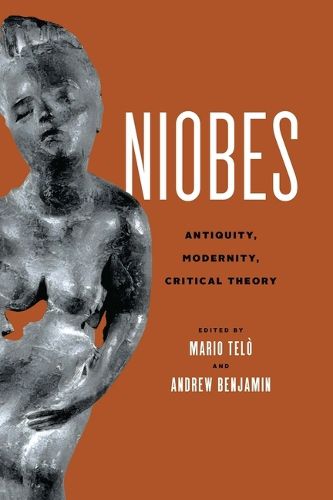Readings Newsletter
Become a Readings Member to make your shopping experience even easier.
Sign in or sign up for free!
You’re not far away from qualifying for FREE standard shipping within Australia
You’ve qualified for FREE standard shipping within Australia
The cart is loading…






This title is printed to order. This book may have been self-published. If so, we cannot guarantee the quality of the content. In the main most books will have gone through the editing process however some may not. We therefore suggest that you be aware of this before ordering this book. If in doubt check either the author or publisher’s details as we are unable to accept any returns unless they are faulty. Please contact us if you have any questions.
A marginalized but persistent figure of Greek tragedy, Niobe, whose many children were killed by Apollo and Artemis, embodies yet problematizes the philosophically charged dialectics between life and death, mourning and melancholy, animation and inanimation, silence and logos. The essays in Niobes present her as a set of complex figurations, an elusive mythical character but also an overdetermined figure who has long exerted a profound influence on various modes of modern thought, especially in the domains of aesthetics, ethics, psychoanalysis, and politics. As a symbol of both exclusion and resistance, Niobe calls for critical attention at a time of global crisis. Reconstructing the dialogues of Phillis Wheatley, G. W. F. Hegel, Walter Benjamin, Aby Warburg, and others with Niobe as she appears in Aeschylus, Sophocles, Ovid, and the visual arts, a collective of major thinkers--classicists, art historians, and critical theorists--reflect on the space that she can occupy in the humanities today. Inspiring new ways of connecting the classical tradition and ancient tragic discourse with crises and political questions relating to gender, race, and social justice, Niobe insists on living on. Contributors: Barbara Baert, Andrew Benjamin, drea brown, Adriana Cavarero, Rebecca Comay, Mildred Galland-Szymkowiak, John T. Hamilton, Paul A. Kottman, Jacques Lezra, Andres Matlock, Ben Radcliffe, Victoria Rimell, Mario Telo, Mathura Umachandran, Daniel Villegas Velez
$9.00 standard shipping within Australia
FREE standard shipping within Australia for orders over $100.00
Express & International shipping calculated at checkout
This title is printed to order. This book may have been self-published. If so, we cannot guarantee the quality of the content. In the main most books will have gone through the editing process however some may not. We therefore suggest that you be aware of this before ordering this book. If in doubt check either the author or publisher’s details as we are unable to accept any returns unless they are faulty. Please contact us if you have any questions.
A marginalized but persistent figure of Greek tragedy, Niobe, whose many children were killed by Apollo and Artemis, embodies yet problematizes the philosophically charged dialectics between life and death, mourning and melancholy, animation and inanimation, silence and logos. The essays in Niobes present her as a set of complex figurations, an elusive mythical character but also an overdetermined figure who has long exerted a profound influence on various modes of modern thought, especially in the domains of aesthetics, ethics, psychoanalysis, and politics. As a symbol of both exclusion and resistance, Niobe calls for critical attention at a time of global crisis. Reconstructing the dialogues of Phillis Wheatley, G. W. F. Hegel, Walter Benjamin, Aby Warburg, and others with Niobe as she appears in Aeschylus, Sophocles, Ovid, and the visual arts, a collective of major thinkers--classicists, art historians, and critical theorists--reflect on the space that she can occupy in the humanities today. Inspiring new ways of connecting the classical tradition and ancient tragic discourse with crises and political questions relating to gender, race, and social justice, Niobe insists on living on. Contributors: Barbara Baert, Andrew Benjamin, drea brown, Adriana Cavarero, Rebecca Comay, Mildred Galland-Szymkowiak, John T. Hamilton, Paul A. Kottman, Jacques Lezra, Andres Matlock, Ben Radcliffe, Victoria Rimell, Mario Telo, Mathura Umachandran, Daniel Villegas Velez